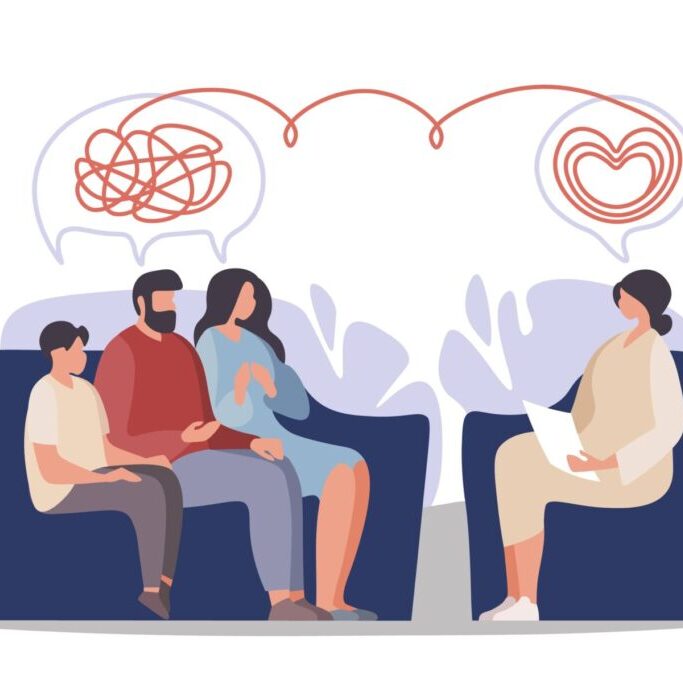How LGBTQ+ Affirmative Therapy Benefits LGBTQ+ People

Finding an affirming therapist is possibly the most crucial element in building a positively impactful therapeutic relationship. While different therapeutic techniques, strategies, and psychoeducation can be helpful to a client, building a relationship with the therapist rooted in affirmation, trust, and mutual respect is often the most impactful and important element in talk therapy.
Studies have shown that an affirming relationship between the client and the therapist leads to better treatment outcomes, client retention, and client satisfaction in therapy. Unfortunately, it can be more difficult for individuals within marginalized communities to find affirming (or even celebratory) services than it is for others.
This can be true for folks within the LGBTQIA+ community. Gender and sexuality can play a huge role in how we see ourselves, our reality, and the world around us. Furthermore, discrimination, societal stigmatization, and lack of understanding often contribute to increased rates of mental health disorders within this population.
It is crucial for LGBTQIA+ affirming therapists to keep the following in mind when working with this population. It’s also important for clients to seek out the following in their pursuit of mental health support:
1. Validating Identity and Experiences:
LGBTQ+ Affirmative Therapy creates a safe and validating space for individuals to explore and express their unique sexual orientation, gender identity, or gender expression. This therapy approach urges clinicians to respect, affirm, and normalize diverse sexual orientations and gender identities, allowing LGBTQ+ individuals to be their authentic selves without fear of judgment or rejection.
This also means that the therapist must be ready to explore the individual’s unique experience with their sexuality/gender. Ideally, an affirming therapist will recognize the importance of your identifier, and acknowledge that there is so much more to explore and learn.
2. Reducing Minority Stress:
The LGBTQ+ community frequently encounters a higher risk of minority stress – the additional stressors and trauma resulting from societal prejudice and discrimination. LGBTQ+ Affirmative Therapy adopts a holistic approach that recognizes the impact of these stressors on mental health and seeks to alleviate them.
Therapists provide clients with tools and coping strategies to overcome internalized shame, prejudice, and self-doubt, fostering resilience and improved well-being. Additionally, it can be important for an affirming clinician to ground life stressors within a systematic context. For example, of course, LGBTQIA+ folks might feel fearful to travel to states that are openly hostile to LGBTQIA+ individuals.
Instead of approaching this issue as merely a function of an anxiety disorder, a skilled therapist who is LGBTQIA+ affirming will be able to provide both validation on the reality/safety concerns the LGBTQIA+ community faces in addition to coping strategies around more systemic issues that disproportionately impact the LGBTQIA+ community.
3. Improving Identity-Specific Mental Health Outcomes:
Research consistently shows that LGBTQ+ individuals are at a higher risk of mental health disorders such as depression, anxiety, and suicidality. LGBTQ+ Affirmative Therapy focuses on identifying and addressing the underlying causes of these mental health issues, often including experiences of rejection, invalidation, and trauma.
By providing a supportive, non-judgmental therapeutic environment, this approach has been successful in alleviating symptoms, enhancing self-esteem, and promoting overall mental well-being. While we might not be able to change the opinions of homophobic or transphobic individuals, LGBTQIA+ affirming therapy can help individuals explore and understand the impact of these rhetorics and how they might be able to have a different relationship with these narratives.
By exploring the impact of homophobic and/or transphobic narratives on the individual, the client can then explore how they might want to replace certain narratives with their own, current value system.
4. Finding Supportive Networks:
One of the essential components of LGBTQ+ Affirmative Therapy is connecting individuals with supportive networks and resources within the LGBTQ+ community. Therapists help clients navigate community centers, support groups, and other safe spaces aimed at fostering connections with peers who share similar experiences, promoting a sense of belonging, and reducing feelings of isolation.
While individual therapy and an affirming relationship with a counselor can be incredibly helpful, it is important that clients also have a sense of belonging and community once they leave the therapeutic space.
For many LGBTQIA+ individuals, community and connections with others who have a queer identifier have been life-saving. An affirming therapist will understand the importance of chosen family, community connection, and the pursuit of a sense of belonging.
5. Encouraging Self-Exploration and Self-Acceptance:
LGBTQ+ Affirmative Therapy empowers individuals to embark on a journey of self-exploration and self-acceptance, enabling them to make sense of their identities and reconcile any internal conflicts that may arise. This approach places an emphasis on self-affirmation, helping individuals embrace and celebrate their unique identities, thus allowing for personal growth and improved mental well-being.
Many LGBTQIA+ may internalize ill-fitting narratives around sexuality and/or gender and it can be important to identify these narratives and explore new narratives that align more with the individual’s experience and value system. An affirming therapist will provide a safe space to explore different identities, relationship to identity, and meet the individual where they are at.
By meeting the client where they are in their experience of their identity, the therapist can hopefully take pressure off “coming out,” which is a pressure many LGBTQIA+ individuals experience. An affirming therapist will know that it is a privilege to be let into your experience of your sexuality and gender, not a debate on whether you should be accepted or not by them or others.
LGBTQ+ Affirmative Therapy plays a pivotal role in addressing the mental health needs of LGBTQ+ individuals. By providing a safe, validating, and affirming therapeutic environment, this approach helps reduce minority stress, addresses mental health challenges, and fosters a sense of belonging and self-acceptance.
As society continues to evolve, it is crucial to recognize and support therapy practices that cater specifically to the unique needs and experiences of the LGBTQ+ community to ensure their mental well-being and overall quality of life.
As a member of the LGBTQIA+ community, you deserve to feel heard, understood, validated and celebrated within your identifier and in your unique experience of your gender, sexuality, and other identities.
This blog is made for informational and educational purposes only. It is not medical advice. The information in this blog is not intended to (1) replace a one-on-one relationship with a qualified licensed health care provider, (2) create or establish a provider-patient relationship, or (3) create a duty for us to follow up with you.



